
COVID-19: lifestyle tips to stay healthy during the pandemic

Eating right, physical activity, adequate rest and taking care of our mental health not only improves overall health and wellness, but also makes us more resilient during COVID-19.
MADIGAN ARMY MEDICAL CENTER, Joint Base Lewis-McChord, Wash. -- COVID-19 has changed many of our daily routines in a way no one anticipated. Many of us are at home more to minimize exposure. Isolation and being at home can illicit the temptation to eat snacks high in sodium, junk food and low-quality meals that provide instant gratification for our taste buds rather than nutrient-dense whole foods that can also be delicious. This is a challenge for many in these times of social distancing and self-isolation.
A day that may have previously included many steps, physical activities like walking from your car at your workplace parking lot twice per day, shopping for groceries, outings with the family or visiting shopping mall are absent for many. With this unprecedented lifestyle shift, there is a potential for the normalization of a more sedentary lifestyle packed with activities like watching television, sitting while reading for long periods, or sitting at your computer for longer-than-usual periods of time. We must stay proactive, and in some cases creative, to maintain an active lifestyle in the era of social-distancing. Even if you are not directly affected by COVID-19, or tested positive, it no doubt has had a drastic impact on your day-to-day routine, which could negatively affect your overall health.
So what are some things we can do to maintain a healthy and active lifestyle and routine while the world around us has adapted to limiting exposure to COVID-19?
- Stay active: The gyms may not be open, however, there are lots of safe alternatives to getting physical activity without going against the preventive best practices recommended by the CDC like social distancing and avoiding large crowds. Aerobics can be done successfully at home. Another important point to consider is that avoiding crowds does not mean avoiding nature. Going for a brisk walk or jog outside in uncrowded areas outdoors is still considered relatively safe. Push-ups, sit-ups, jumping-jacks and more exercises are great ways to stay fit away from the gym. For more ideas, visit: https://www.aflcmc.af.mil/News/Article-Display/Article/2147181/staying-physically-active-during-covid-19/.
- Adequate sleep: Good sleep is essential to our overall health. According to The National Institutes of Health (NIH), a part of the U.S. Department of Health and Human Services and the nation’s leading medical research agency: “Immune system activation alters sleep, and sleep in turn affects the innate and adaptive arm of our body's defense system.” While the amount of sleep needed for good health and optimum performance mostly depends on the individual, the CDC recommends adults age 18-60 years get seven or more hours of sleep per night.
- Diet and nutrition: Practicing self-discipline and avoiding “emotional eating” due to stress that may be related to the drastic changes surrounding the COVID-19 pandemic and how it affects our lives is imperative. According to the CDC, whole foods like dark, leafy greens, oranges and tomatoes—even fresh herbs—are loaded with vitamins, fiber and minerals. Make it a habit to try to eat more whole nutritious foods instead of processed snacks or fast food.
- Self-care: Take time to take care of yourself. Be supportive and suggest the same for those close to you. Meditation, relaxation, quality time with family, personal care of yourself promotes overall wellness. The Defense Health Agency (DHA) has free, evidence-based, self-care tools developed by psychologists that you can check out here: https://health.mil/About-MHS/OASDHA/Defense-Health-Agency/Operations/Clinical-Support-Division/Connected-Health/mHealth-Clinical-Integration
- Healthcare maintenance: If you have medications prescribed for any condition, be sure to take them as directed by your provider. Chronic conditions such as hypertension, diabetes, asthma and many others should be kept in check with taking your medications as prescribed. Be sure to reach out to your healthcare team with any concerns as well. In the age of COVID-19, telehealth solutions are available if you want to speak with a provider about a health concern unrelated to COVID-19. Madigan patients, for instance, can still utilize Secure Messaging in the MHS GENESIS Patient Portal to request an appointment or call the Puget Sound Military Appointment Center at 1-800-404-4506 to schedule a telehealth appointment.
- Cope with stress and anxiety: Positively cope with stress and anxiety induced by new precautions we must all now take to combat the spread of COVID-19 in our communities. Positive coping mechanisms would include exercise, meditation, reading, further developing certain skills or hobbies etc. Use this era to increase your daily repetition of these positive activities and develop new or even better routines than you may have adhered to prior to the emergence of the current COVID-19 pandemic.
- Stay connected: Talking with loved ones while in isolation can help reduce the anxiety and instances of feeling down. Take time to utilize the multitudes of technologies and apps (many free) that can help you stay in touch with those you love. Our busy lives before the COVID-19 may have limited how often we connected with distant loved ones, now’s the time to fully exploit these modern capabilities for fellowship, companionship, and camaraderie.
The guidance above is to improve overall health and wellness. Please be aware that although eating nutritious foods, physical activity, adequate rest and taking care of our mental health makes us more resilient, it’s not a cure nor does it guarantee immunity from contracting COVID-19. In addition to these suggestions, first and foremost be sure to practice CDC guidance on social distancing, self-care, self-quarantine, wearing of cloth masks when social distancing is not possible and talking with your provider about any concerns you may have regarding your health. If you have a medical emergency, visit an emergency room. If you have an injury or illness unrelated to COVID-19, be sure to visit an Urgent Care Center. If you have questions or do not know exactly what to do, call the MHS Nurse Advice Line at 1-800-TRICARE (874-2273), option 1.
Disclaimer: Re-published content may be edited for length and clarity. Read original post.
Using mobile mental health apps to cope during social isolation
Article
5/22/2020
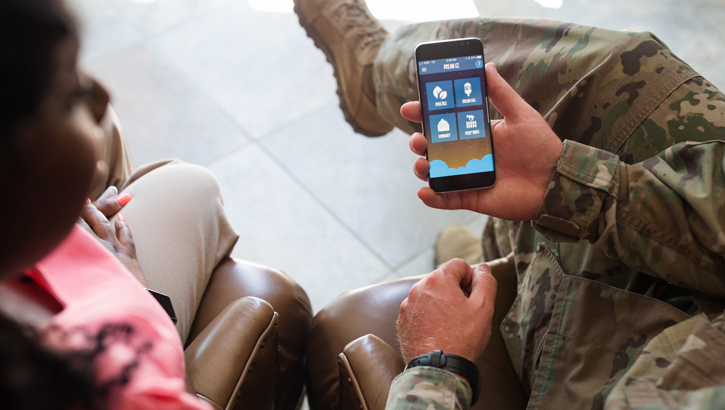
Learn how your smartphone can serve as a lifeline
Medical maintainers play key role in Army’s response to COVID-19
Article
5/22/2020
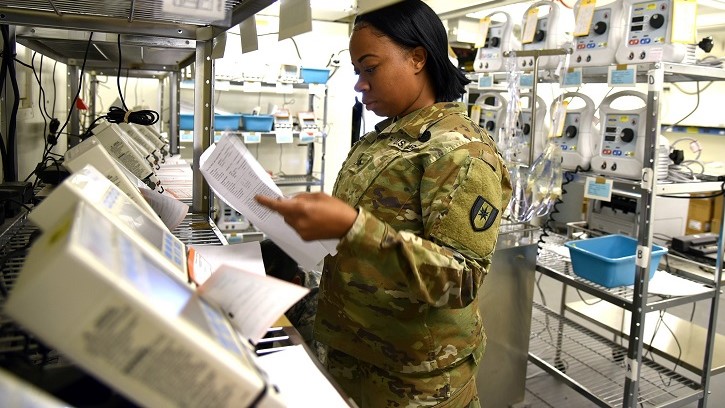
In the field, Soldiers trained as Biomedical Equipment Specialists, or 68As, handle unit-level sustainment of deployed medical devices.
VENDOR UNSOLICITED PROPOSAL IN SUPPORT OF COVID-19
Form/Template
5/21/2020
Unsolicited Proposal Information Supporting COVID-19
NMHM opens ‘virtual doors’ to the public during COVID-19
Article
5/21/2020
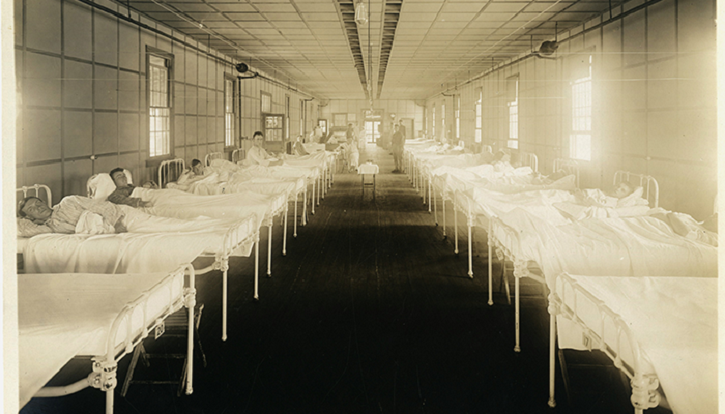
In the current climate of COVID-19 and stay-at-home orders, virtual environments have become an invaluable means of entertainment and education.
Air Force bioenvironmental engineers expand mission in aerovac, workspaces
Article
5/21/2020
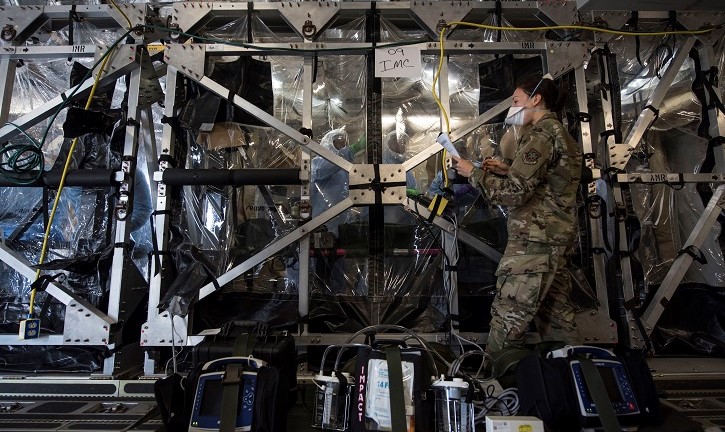
The aeromedical evacuation mission became a top priority as COVID-19 began to spread.
Guidance for Commanders on Risk-Based Changing of Health Protection Condition Levels During the Coronavirus Disease 2019 Pandemic
Publication
5/20/2020
This memorandum provides guidance for commanders to consider when making decisions to change health protection condition (HPCON) levels as COVID-19 pandemic conditions on and adjacent to our installations begin to improve.
NHB/NMRTC Bremerton’s PHEO leans in on COVID-19 pandemic
Article
5/20/2020
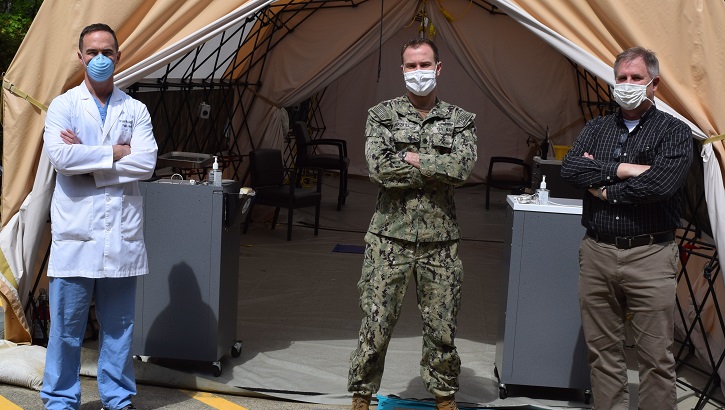
It’s been long days preparing for the unpredictable, limiting the unforeseen and controlling the unexpected.
Resuming Elective Surgical, Invasive, and Dental Procedures in Military Medical and Dental Treatment Facilities
Publication
5/19/2020
This memorandum provides guidance on how each Military Medical Treatment Facility (MTF) and Dental Treatment Facility (DTF) may resume elective medical and dental procedures.
METC creates innovative training to graduate RT students
Article
5/19/2020
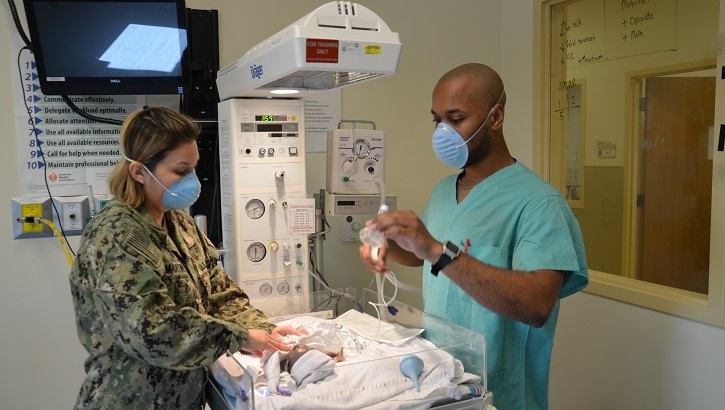
When COVID-19 interrupted phase 2 clinical training a class of Army and Navy respiratory therapist students needed to from the program, their clinical training instructors developed a plan and put it to action.
Military chaplains emphasize spiritual health during COVID-19 pandemic
Article
5/19/2020
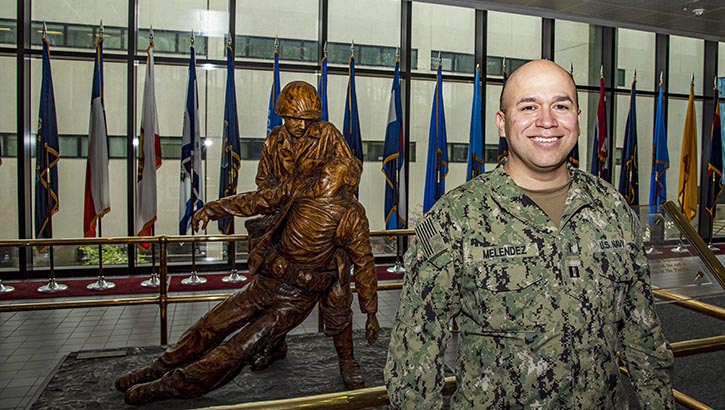
In a time of great fear, spiritual health remains an important domain of Total Force Fitness.
DHA increases access to telehealth during COVID-19 pandemic
Article
5/19/2020
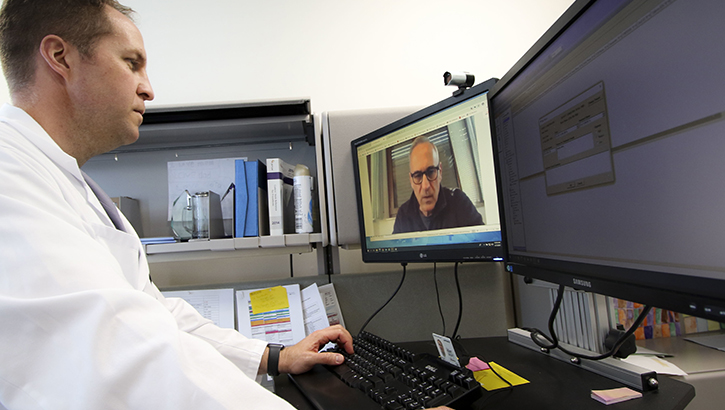
Use of telehealth role increases to prevent COVID-19 spread
RWBAHC Soldier Shows compassion, initiative in COVID-19 Screening
Article
5/18/2020

"This type of behavior needs to be highlighted and awarded because it is truly what makes this organization great."
Expert panel on infection control to tackle COVID-19 questions
Article
5/18/2020
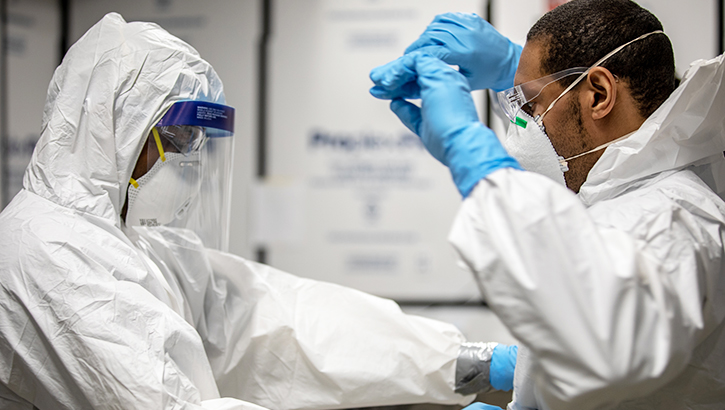
How are patient safety decisions made during the pandemic?
DoD COVID-19 Practice Management Guide Version 3
Technical Document
5/14/2020
This COVID-19 Practice Management Guide has been rapidly and thoughtfully developed by a multi-specialty group of 60 subject matter experts from across the Department of Defense Military Health System. The intent of this publication is to provide clinicians and military medical treatment facilities (MTFs) with best practices based on latest evidence to optimize DoD response to the current COVID-19 pandemic. This Practice Management Guideline consolidates resources and optimizes the management of patients requiring clinical care during the global COVID-19 pandemic.
DHA leaders bring expertise to DoD COVID-19 Lab Testing Task Force
Article
5/14/2020

Testing a key next step in the coronavirus fight





















.png)












No hay comentarios:
Publicar un comentario